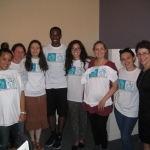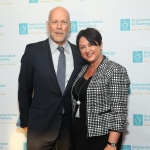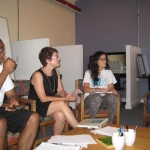News
Kazickas Family Foundation sponsored Dr. Vilma Makauskiene‘s fellowship at the American Institute for Stuttering where last June she participated at the two week intensive therapy program for people who stutter. Dr. V. Makauskiene is a speech pathologist and psychologist at the Center for Speech and Language Disorders in Kaunas, Lithuania.
On June 6th, she also participated at the American Institute of Stuttering annual gala, Freeing Voices, Changing Lives, where actor Bruce Willis, Vice President of the USA Joe Biden and many other well known people dealing with stuttering problems participated, as well as many more supporting the cause. In their speeches both, Bruce Willis and Joe Biden, emphasized that it is extremely important to accept the stuttering, not to avoid socializing and not to allow it to stop you from reaching your goals.
Dr. V. Makauskiene shared her experience at the American Institute of Stuttering: "I am extremely grateful to the Kazickas Family Foundation for its financial support. Thanks to Kazickas family I had an opportunity to participate at the two week intensive therapy program for people who stutter. They try to help people who stutter in Lithuania, as well as specialists helping them to overcome psychological issues due to their stuttering. I‘m committed to share the knowledge I received during the program with all the people who stutter, their families, and to introduce Lithuanian speech pathologists to the amazing work of the American Institute of Stuttering.
The American Institute of Stuttering is well known to the entire world, because of its specialists’ significant experience. While working with a person or group of people who stutter, the goal is not just to minimize the symptoms of stuttering, but to help change negative thoughts, overcome anxiety, shame, and to improve their quality of live. Institute‘s motto “Speak Freely, and Live Fearlessly” describes its main goals – to help people who stutter to change the way they socialize, earn more confidence and to overcome the fear of talking. Such goals are accomplished by open approach to stuttering, active group participation, socializing with many different people in various situations.
I’ve previously participated at the various stuttering programs in the US, Canada and European countries. This program is different from the others because of its goals. Its main purpose was not to focus on smooth talking techniques, but by applying cognitive behavioral therapy to minimize avoiding socialization, change the way stutterers see themselves and their stuttering, and to overcome a fear of talking in everyday life situations.
The American Institute of Stuttering offers program for people who stutter where they can practice in a group, with others who stutter and individual practice. Participants had many practical assignments related to the obstacles that people who stutter run into every day. There were many conversations about the avoidance of socializing, fear of talking, emotional reactions to stuttering, feeling ashamed and lack of confidence. For instance, one girl‘s name was Taylor and when ordering coffee at „Starbucks“ she gave different name every time avoiding a risk of stuttering. Eventually, she couldn‘t remember what name she said at which coffee shop and became nervous that sales people would notice her giving different name every time. In the beginning of the program, participants had to accomplish different tasks on a street talking to the strangers. They had to ask simple questions, such as what time is it now or where are different objects (such as museum, subway station, certain street, etc.). The last task of overcoming the fear of talking practice was to get on crowded subway train and say „Good afternoon, my name is v-v-v-v-Vilma, I st-t-t-tutter and I need an audience. Thank you for your attention.“ It is hard to understand what it means to a person that stutters to say such words in such crowded place!? Many participants said „There is nothing I‘m afraid of anymore, because I‘ve overcome my fear”. Thanks to the program, many participants managed to accept their stuttering. They were encouraged to analyze their emotional experiences, realize how thoughts affect the behavior. For instance, people calling about job interview get anxious before making that phone call. Such thoughts affect emotions and it becomes harder to talk because stuttering gets worse. Students often give excuses to their teachers to simply avoid public speaking.
This fellowship at the American Institute of Stuttering gave me confidence while working with a group of people who stutter, provided me with more knowledge, fresh ideas that I can use in my practice. Participating at such intensive program gave me more understanding that overcoming stuttering is speech pathologist‘s and a person‘s who stutters journey together, because changes in socializing depend on motivation, predisposition and acceptance. I‘m so proud of my patients who put so much effort into overcoming their stuttering, I‘m so happy to see their courage and unbelievable will to communicate and I’m extremely grateful to them for trusting in me."
|
|
|
Photos: Courtesy of V. Makauskiene




